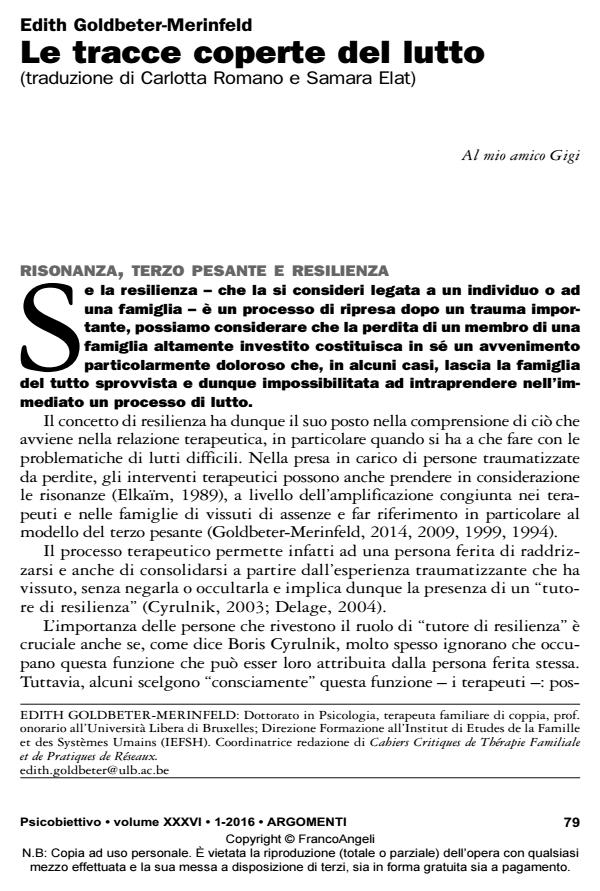The covered traces of mourning
Journal title PSICOBIETTIVO
Author/s Edith Goldbeter-Merinfeld
Publishing Year 2016 Issue 2016/1
Language Italian Pages 8 P. 79-86 File size 107 KB
DOI 10.3280/PSOB2016-001005
DOI is like a bar code for intellectual property: to have more infomation
click here
Below, you can see the article first page
If you want to buy this article in PDF format, you can do it, following the instructions to buy download credits

FrancoAngeli is member of Publishers International Linking Association, Inc (PILA), a not-for-profit association which run the CrossRef service enabling links to and from online scholarly content.
Some losses create such a strong trauma that the mourning process cannot be initiated. Consequently symptoms appear which, exercise the function of covering incurable wounds, diverting the attention of all family members to other sources of discomfort. This article offers two clinical examples of this type of problem as well as any possible strategies oriented towards resilience.
Keywords: Trauma; Mourning; Resilience; Ghost
- Freud S. (1915-1940) “Deuil et mélancholie”, in Freud S., Métapsychologie (traduction de J. Laplanche, J.-B. Pontalis), Gallimard, Paris
- Goldbeter-Merinfeld E. (1994) “Il Terzo pesante del sistema”, Psicobiettivo, XIV(2): 69-75
- Goldbeter-Merinfeld E. (1999) “Lutto e fantasmi”, Psicobiettivo, XIX(2): 27-58
- Goldbeter-Merinfeld E. (2009) “Résilience, résonance et tiers pesant”, in Cyrulnik B., Elkaïm M. (maestre m. dir.), Entre résilience et résonance. À l’écoute des émotions, Éd. Fabert, Paris, pp. 111-120
- Goldbeter-Merinfeld E. (2014) Il lutto impossibile, FrancoAngeli, Milano
- Paul N.L. (1967) “The role of mourning and empathy in conjoint marital therapy”, in Zuk G., Boszormenyi-Nagy I. (eds.), Family Therapy and Disturbed Family, Science and Behavior Books, Palo-Alto
- Roustang F. (2000) La fin de la plainte, Odile Jacob, Paris
- Abraham N., Torok M. (1978) L’écorce et le noyau, Aubier Flammarion, Paris
- Elkaïm M. (1989) Si tu m’aimes, ne m’aime pas, Seuil, Paris
- Elkaïm M., Goldbeter A., Goldbeter E. (1980) “Analyse des transitions de comportement dans un système familial en termes de bifurcations”, Cahiers Critiques de Thérapie Familiale et de Pratiques de Réseaux, 3: 18-34
- Cyrulnik B. (2003) “Comment un professionnel peut-il devenir un tuteur de résilience”, in Cyrulnik B., Seron C.L., La résilience ou comment renaître de sa souffrance, Fabert, Paris, pp. 23-43
- Delage M. (2004) “Résilience dans la famille et tuteurs de résilience. Qu’en fait le systémicien?”, Thérapie Familiale, 25(3): 339-347
Edith Goldbeter-Merinfeld, Le tracce coperte del lutto (traduzione di Carlotta Romano e Samara Elat) in "PSICOBIETTIVO" 1/2016, pp 79-86, DOI: 10.3280/PSOB2016-001005